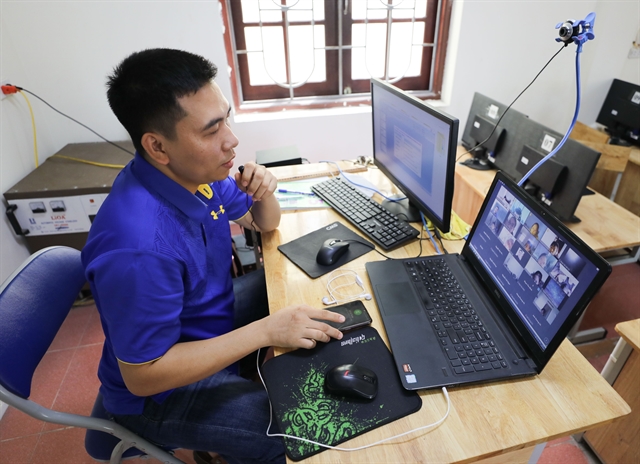 Society
Society

The COVID-19 pandemic has had many impacts socio-economic life, in which education is one of the most affected industries and the sector has implemented online teaching and learning to adapt to the new situation.

|
| A teacher gives an online lesson at the Dương Quang Primary School in Gia Lâm District, Hà Nội. — VNA/VNS Photo Thanh Tùng |
HÀ NỘI — The COVID-19 pandemic has had many impacts socio-economic life, in which education is one of the most affected industries and the sector has implemented online teaching and learning to adapt to the new situation.
An online ceremony to launch the programme “Sóng và máy tính cho em” (Internet connection and computers for students) chaired by Prime Minister Phạm Minh Chính on September 12 touched the community’s hearts. It called for increased care for poor students who cannot afford computers as online learning becomes the "new normal".
The programme is to implement the Prime Minister’s direction on prioritising and supporting disadvantaged students who lack online learning facilities. It ensures fairness in accessing new teaching and learning methods, thereby contributing to the development of a digital society.
In response to the PM’s call, Hà Nội immediately implemented a programme to support poor students.
Hà Nội’s programme has received support from different organisations, said chairwoman of the Hà Nội Women’s Union Lê Kim Anh.
Specifically, the Vietnam Joint Stock Commercial Bank for Industry and Trade (Vietinbank) – Nam Thăng Long Branch presented 25 laptops worth VNĐ270 million (US$11,800); the Nam Từ Liêm District Women’s Union gave VNĐ50 million ($2,100); the Hà Đông District Women’s Union gave VNĐ10 million ($440); and the Tây Hồ District Women’s Union presented 20 iPads worth VNĐ42 million ($1,800) and other learning equipment.
Others districts' and towns' women’s union have also presented 115 electronic devices including computers, laptops, iPads and smartphones to poor students in Quốc Oai, Ba Vì, Đan Phượng, Đông Anh and Gia Lâm.
Anh said the union would encourage organisations, enterprises and individuals to support the programme with new or old electronic devices that are still in good condition. The devices will be given to poor students to help their online learning.
Especially, each worker of the union will also donate a part of their salary to the programme.
The Hà Nội Women’s Union organised a training course for parents to help their children in online learning.
Lê Đức Thuận, director of the Ba Đình District Education and Training Division, said in response to PM Chính’s programme, the division worked with the district red cross society to present 235 computers to poor students in the district.
Schools also joined the programme.
The Nguyễn Tri Phương Junior Secondary School in Ba Đình District on September 14 launched a programme to help poor students at the school.
The school planned to buy 11 computers each worth VNĐ7.1 million ($312) for poor students or whose parents are invalids and martyrs. Each of them will also receive VNĐ2 million ($88) to install internet connections.
The school library will be equipped with eight new computers for students to use or borrow.
Phạm Thị Hương Giang, principal of the school, said: “Seeing co-operation and support from the State leaders, enterprises and the community, the education sector feels it is not left behind.”
“COVID-19 is a short-term enemy whereas poor education and poverty is a long-term enemy which need efforts of the whole society. I highly appreciate all people’s help in connecting and donating computers to poor students,” she said.
Nguyễn Khắc Tuấn, a maths teacher at Vietschool Pandora Primary and Junior Secondary School in Hà Nội told the Lao Động (Labour) newspaper that the programme was meaningful, but could face financial difficulties.
At present, the programme really needs co-operation of the whole society.
Besides funding for computers, enterprises could support poor students with software or data packages for internet use.
Tuấn suggested enterprises work closely with localities to give proper support to students, not only when the new school year starts, but also in the long term.
The work needs to be done regularly and continuously so that students in difficult circumstances could receive stable and long-term support for the road ahead, he said.
Lê Thu Thảo, a teacher of the Hoàng Liệt Junior Secondary School in Hoàng Mai District in Hà Nội, expressed her belief that the programme would help shorten the distance between different areas, especially remote mountainous areas.
Amid the fourth industrial revolution, students in remote areas would receive support from the programme, and online learning would no longer be a luxury, she said.
The “Sóng và máy tính cho em” (Internet connection and computers for students) aims that by the end of this year, the whole country would be connected to the internet. As many as one million poor students will be equipped with electronic devices for online learning. In the 2022-23 period, no poor students will lack computers for online learning. — VNS




